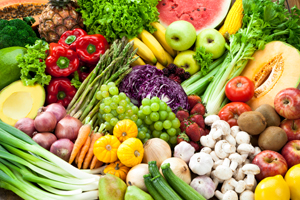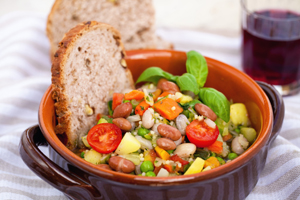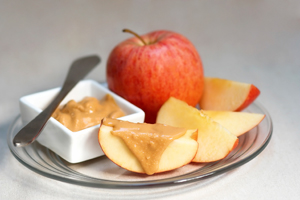According to the calendar (if not the weather forecast), spring has arrived! The longer days, (supposedly) milder weather, and reappearance of green shoots in patches of soil often inspire a change in eating patterns; cravings for hearty stews and heavy comfort foods give way to an appetite for bright, fresh foods.
If you have been hearing about the Mediterranean Diet in the news and from your friends and wondering if it might be right for you, now is the time to get started! The Med Diets emphasis on fresh foods makes the beginning of the growing season a great time to make some healthy changes! And lucky for you we are here with 9 simple steps for getting started on the Mediterranean Diet:
1. Eat lots of vegetables.
Fresh fruits and vegetables make up a significant amount of the base of the Mediterranean Diet Pyramid. Vegetables are vitally important to the fresh tastes and delicious flavors of the Med Diet. Try filling half your plate with them at lunch and dinner.
A great way to ensure that you enjoy a variety of fresh veggies daily is to purchase a share in a local CSA (community supported agriculture). You pay a
single price in the early spring to be a member of or have a share in a local farm. In return, you receive an entire season of fresh produce. Typically CSAs have a weekly pick-up or delivery of produce. Participating in a CSA means having the opportunity to try vegetables you might not otherwise purchase, always having fresh vegetables on hand for meal preparations, enjoying the amazing flavor and nutritional quality of locally grown produce, and supporting your local economy. Use LocalHarvests search tool to And a CSA near you.
Another easy way to enjoy fresh, locally grown produce is to frequent the farmers markets in your area. Stopping at a farmers market on the way home from work or school can be a quick and easy way to FIgure out what’s for dinner. Find a farmers market near you with the USDAs search tool.
Once you’ve found a great source for fresh veggies, be sure to consult the Oldways Recipe Database for meal ideas! And don’t forget to pick up a reusable grocery bag for your trips to the farmers market.
2. Change how you think about meat.
If you eat meat, have smaller amounts. For example, add small strips of sirloin to a vegetable sauté, or garnish a dish of pasta with diced prosciutto. As a main course, have smaller portions (3 ounces or less) of chicken and lean meat.
Because the Mediterranean Diet encourages relatively sparse use of meat, the investment in high quality meat, including grass-fed beef and free-range chicken, can even It into a budget-conscious menu plan. Find a source for locally raised meat (check your farmers markets, food co-ops, local butcher shop, or specialty food store). And if you are unable to And locally raised meat, try checking Eat Wild’s list of farms that will ship to you.
3. Always eat breakfast.
Start your day with Fber-rich foods such as fruit and whole grains that can keep you feeling pleasantly full for hours. Layer granola, yogurt, and fruit, or mash half an avocado with a fork and spread it on a slice of whole grain toast.
4. Eat seafood twice a week.
Fish, such as tuna, herring, salmon, and sardines are rich in heart-healthy omega-3 fatty acids, and shelLFIsh including mussels, oysters, and clams have similar benefits for brain and heart health.
Need help deciding what to buy at the fish counter Download a Monterey Bay Aquarium Seafood Watch pocket guide or their Seafood Watch mobile app.
5. Cook a vegetarian meal one night a week.
Build these meals around beans, whole grains, and vegetables. Heighten the flavor with fragrant herbs and spices. When one night feels comfortable, try
two or three nights per week.
The Oldways Vegetarian Network has the resources you need to build balanced, healthy, delicious vegetarian meals. Be sure to check out the What You Can Do Withand 12 Great Ways to Useresources to get ideas about how to incorporate new foods into your meal rotation.
6. Use good fats.
Include sources of healthy fats in daily meals, especially extra-virgin olive oil, nuts, peanuts, sunflower seeds, olives, and avocados.
7. Enjoy some dairy products.
Eat Greek or plain yogurt, and try small amounts of a variety of traditionally crafted cheeses.
8. Indulge in fresh fruit for dessert.
Choose from a wide range of delicious fresh fruitsfrom fresh eggs and oranges to pomegranates, grapes, and apples. Instead of daily ice cream or cookies, save sweets for a special treat or celebration.
9. Share your experiences.
Enjoy family meals and dine with friends. Take time to enjoy both cooking and eating your meals.
-Hannah










